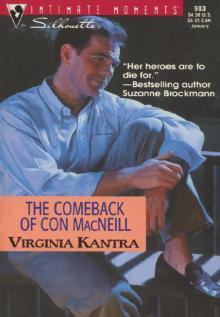- Home
- Virginia Kantra
Dare Island [2] Carolina Girl Page 2
Dare Island [2] Carolina Girl Read online
Page 2
“I’ll get the elevator for you,” Luis said.
She was too exhausted to argue. She followed him down the hall to the elevators.
The third-floor, two-bedroom apartment she shared with Derek didn’t provide the Central Park view he had wanted. But the space had still cost more than Meg could comfortably afford. Despite Derek’s larger salary, she had insisted on their splitting expenses right down the middle.
Her parents had not approved of the condo or, she sometimes thought, of Derek. They could not understand why, after six years together, she and Derek didn’t simply get married.
Meg had dismissed her family’s concerns. She didn’t need a ring to establish her worth or validate her relationship. The joint investment in the condo was another step, another sign that her life and career were proceeding according to plan.
She swallowed hard. Or they had been until an hour ago.
She let herself into the empty apartment. Leaning back against the door, she closed her eyes. The living room had the chilled hush of a funeral parlor. The surrounding units were quiet, everyone at work. No scraping furniture penetrated into the apartment, no footsteps, no chattering TVs, only the muted sounds of traffic drifting from the street.
What was she supposed to do with herself in the middle of the day? What was she going to do?
She took off her shoes, her jacket, her earrings, divesting herself of her corporate armor piece by piece. Without it she felt naked. Vulnerable.
She wandered through the apartment like a sleepwalker, her limbs weighted by lethargy, her body infected by an odd, internal restlessness.
She couldn’t eat. Couldn’t text or call or go on-line. They’d never bothered to pay for a landline or personal computer. Why should they? The company provided everything. Now, even if she’d had her BlackBerry, her phone and e-mail contacts, all her personal network, were wiped out when IS had disabled her account.
No wonder her password had failed that morning.
She stopped at the window, staring down at people flowing by like twigs caught in a current: envoys from office buildings moving purposefully along the sidewalks, mothers pushing strollers on their way to the park, tourists wandering arm in arm, stopping to point or to kiss. Everyone had somewhere to go, someone to be with, while she stood alone, apart, removed from all of them.
Where was Derek?
He didn’t come at lunchtime. She was relieved. As long as he was at the office, he still had a job.
But he wasn’t home at five o’clock.
Or at six.
Or at seven.
Of course he couldn’t call, she told herself as the minutes and hours ticked by. She didn’t have a phone. And she couldn’t call him. She couldn’t leave the apartment, even if she planned to buy a phone, even if she knew where to find a pay phone. What if Derek showed up while she was out? She didn’t know any of their neighbors well enough to go knocking on doors. What could she say? Hi, I’ve lost my job and I can’t reach my boyfriend, may I use your phone? She shuddered. That would be a hell of an introduction.
She paced the thick, mushroom-colored carpet. Her inactivity, her isolation, her helplessness drove her crazy. How could Derek do this to her? He must know she was waiting. He must have heard that she’d been . . . Her mind recoiled from the word fired. She’d been let go.
She didn’t get it.
She’d worked hard to get to a place where she was indispensable, on top, in control. Vice president of marketing and public relations for a Fortune 500 company. No vacationing rich kid on the island for the summer, no legacy student from Harvard, no cigar-sucking, golf-club-swinging member of the Old Boys’ Network was ever going to look down on her again. She flung herself onto the couch.
By eight o’clock, she was shaking with fear and a hot, defensive anger. Derek still wasn’t home. What if something had happened to him? Her mother, after all, had recently been the victim of a drunk driver. Didn’t he care about her feelings at all?
At nine o’clock, a key scraped in the lock.
She jumped to her feet, bubbling over with worry, relief, and resentment. “Where have you been?”
Derek stopped inside the door, his blond hair shining in the yellow light of the hall, his face shadowed. “Putting out fires.”
He sounded tired.
She crossed her arms against her chest. “With what? Scotch?”
“I had to go out with the team after work. You know how it is.” He stretched his neck, rolled his shoulders. “Christ, what a day.”
She did know. He was under stress, too, she reminded herself. “Are you all right?”
He slid out of his jacket. Shot her a look. “What do you think?”
She didn’t know what to think. He hadn’t told her anything yet. “I was worried about you.”
He nodded as he crossed to the dry bar, accepting her concern as his due.
She waited for him to reciprocate with questions. Sympathy. She didn’t expect him to coddle her. That wasn’t their way. But surely he would say something. When he didn’t, she prompted, “I suppose you heard about my day.”
He poured himself two fingers of Laphroaig. A calculated amount, suggesting restraint and appreciation at the same time. He would have had the same at the bar. Derek never did anything—even drink—without calculating its effect. “Hell, yes. That’s all anybody wanted to talk about. I had a bitch of a time getting them to focus on the significant aspects of the acquisition.”
Ice trickled down her spine. Frosted her voice. “You don’t consider my firing significant?”
The bottle cracked against the rim of his glass. “Of course it’s significant. I just meant I had a lot on my plate this afternoon.” He set the bottle down and crossed the room, cupping her jaw in his smooth, capable hands. “It was hell for me, not being able to talk to you.”
His breath was warm against her face. Meg closed her eyes. It was hell for her, too.
Derek’s familiar scent enveloped her, his starched shirt, the smokiness of Scotch, the cool, expensive tang of his cologne. “I wish you had come home,” she said, hating the admission, detesting the needy, uncertain tone of her voice.
“I wanted to,” he said. “I thought you’d appreciate some time to yourself.”
She opened her eyes. “Twelve hours?”
He released her face. “It wasn’t that long.”
She wasn’t going to argue over minutes. “You said we were partners, Derek. We’re a team. I needed you to have my back today, and you weren’t here.”
His brows twitched together in annoyance. “I have your back.”
“I just got fired!” With an effort, she modulated her voice. She was going to be reasonable if it killed her. “You’re on the transition team. You could have fought for me. You at least could have warned me.”
“You know I couldn’t do that. I can’t show any favoritism. I have to act in the best interests of the company.”
Ouch. As if keeping her around wasn’t good for the company.
“What about my interests?” she asked. “Or don’t they matter anymore?”
“Of course you matter. Have you considered that this Parnassus acquisition could be the best thing that could happen to you? To us.”
Meg gritted her teeth. “What the hell are you talking about?”
“Look, there was always going to be a certain awkwardness as long as we were with the same company. Now there’s nothing holding us back. Personally or professionally.” He smiled at her, unusually charming for a finance guy, and unease moved in her bones.
“Nothing except I’m out of a job.”
His lips tightened. “There’s no need to raise your voice, Meg. People are losing their jobs all over. It’s this economy.”
“The economy didn’t fire me.”
“My point is, you can find another job. This could be the opportunity we need to figure out what we really want. Where we’re going.”
“We know where we’re going. Or I thought I did.” One rung, one
step at a time. Never look down, never look back. “I thought we were getting there together.”
“We are together. All the time. All we ever talk about is work. This is our chance to expand our horizons. Examine our priorities.”
Easy for him to say. He had a job.
“Forgive me if I don’t feel very high on your list of priorities at the moment.” She sounded bitter. Well, she felt bitter. Twelve hours.
He examined her face. Set down his drink. “I know this is hard for you, Meg. This transition has been a strain on both of us. But I’m up to my ears right now. I can’t afford to get caught up in some personal drama. I have to keep my head in the game.”
She drew back, stung. “I’m not asking you to stick around and hold my hand all day. I’m just saying I could use a little emotional support.”
He drew in his breath, the way he did when she was being difficult. “I understand. But you can’t disappear for two weeks and then complain because I’m a little late coming home from the office.”
“My mother was hit by a fucking drunk driver. She was in the hospital. I had to be there.”
“Well, maybe you should think about going back to see her, then. Going home.”
She stared at him in disbelief. She was home. “I just left North Carolina three days ago. I need to stay in New York.” I need to fight. “I need to look for another job.”
“Sure,” Derek said. “But it wouldn’t hurt for you to step back and get a little perspective first.”
Her face felt stiff. She had to work to keep her voice even. “Are you saying you don’t want me around?”
“Of course not.” His breath escaped in a long-suffering sigh. “Don’t you think I could use your support right now? My job’s on the line, too, you know. You can’t get upset because I don’t have the luxury of giving you the attention you deserve.”
Her jaw ached. Probably because she was clenching her teeth so hard. “Fine.”
She would not cling. She refused to whine. Even at sixteen, she’d had too much pride to beg.
She squared her shoulders. “My mother gets out of rehab in another week. Maybe I’ll go down there for a little while to help out. That would certainly provide us with perspective,” Meg added, unable to keep the bitterness from creeping back into her voice.
She waited, her blood drumming in her ears, for him to ask her to reconsider. To plead with her to stay.
He smiled, obviously relieved. “That’s a great idea. It will do you good to get away. I know how close you are to your family.”
It went against her nature to bite her tongue. But she was no longer the impulsive, deluded adolescent she’d been in high school. She didn’t need Derek to fix her problems. She didn’t want his pity. She wanted him to . . . What?
Hold her. Want her, she supposed. Fight for her.
Which was ridiculous. Of course he wanted her. They’d just bought a condo together.
So she forced herself to nod and listen as he told her about his day. As if a recitation of his schedule could somehow fill the void inside her chest.
First thing in the morning she was buying a computer to check airfares to North Carolina.
* * *
THE BAGGAGE CAROUSEL clacked in time to the headache pulsing behind Meg’s eyeballs.
Her flight from LaGuardia had been delayed forty-seven minutes, making her miss her connection, stranding her in Charlotte for almost two hours.
She stood in the Jacksonville baggage claim, watching the same damn six suitcases sidle through the rubber curtain and circle the conveyor belt. Clack, clack, clack.
None of them was hers.
She adjusted her stance, arches aching in her three-inch heels, and dug for her new phone. With one eye on the moving belt, she checked the display screen.
Nothing.
Her stomach dropped. Maybe Matt was on his way. And maybe her brother hadn’t gotten her text explaining she was late. But then wouldn’t he be here, waiting for her? Wouldn’t he have called?
Unless he hadn’t registered the change in her phone number. Her coveted 917 number, the original cell phone code for Manhattan, was gone forever. She hadn’t confided her firing to her family yet. It was too recent. Too raw. Maybe her brother was still leaving messages on her defunct office voice mail.
She winced. If Matt didn’t turn up, if he didn’t call back soon, she’d have to rent a car to drive the hour and a half from the airport to Dare Island.
The carousel wheezed. Bags and machinery thumped. The passengers around her pressed forward as the first bags rattled into sight and toppled onto the belt. A young mother in jeans and flip-flops retrieved an infant seat. A Marine hoisted his duffel bag. A sleek red Tumi suitcase slid through the curtain, looking as out of place in this one-runway town as Meg felt.
At last.
Meg stooped for her bag. Only to be shouldered easily aside by a large, warm, male someone at her back.
A long arm reached around her. A strong hand—tanned, long fingered—grasped the handle of her suitcase.
She recognized his hand before she saw his face.
Knew his voice in the pit of her stomach, in the telltale leap of her stupid heart, before she registered his words.
“I’ve got this,” Sam Grady said and plucked her bag from the belt.
Two
MEG’S PULSE KICKED. Her nerves danced as if she were sixteen again. Not good. “Sam,” she said flatly. “What are you doing here?”
He turned, flashing that you-know-you-want-me smile, and even though Meg told herself she was inoculated against his charm, something inside her melted. The mother with the infant seat stopped strapping in her child and sighed.
That was Sam for you, Meg thought. Women had been throwing themselves at him since puberty.
She should know. She’d been one of them.
His dark hair was a little longer and his body, in jeans and a black Polo shirt, had filled out some since his glory days in high school. But his eyes were the same, green, clear, and sharp as a broken bottle, and his smile could still sell anything to any woman foolish enough to buy. Toothpaste. Unnecessary luxury items. Sex.
“I’m here to pick you up,” he said in his good ol’ boy drawl. Deeper and more resonant now, like Bourbon filtered through twilight. So different from Derek’s flat, refined, New England prep school voice.
Meg smiled coolly, ignoring the liquid pull of her hormones. “Then you need to work on your lines. This is an airport, not a bar.”
Sam’s eyes glinted. “Matt told me you needed a ride.”
Crap. It figured. Sam was her brother’s best, his oldest friend. If Matt couldn’t meet her at the airport, naturally he would call Sam. “Is he all right?”
Sam nodded. “Fine. He’s taking a couple of lawyers out after bluefin.”
Her brother Matt earned his living on the water, charter sport fishing most of the year in the sleek Sea Lady II, commercial fishing sometimes in winter in their grandfather’s old-fashioned, wood-hulled boat. It was not the life Meg had ever wanted, but she respected her brother’s choices. As a single dad, Matt hadn’t had an easy time providing and caring for his son. And since their mother’s accident, he’d had his hands full running his own business and keeping an eye on their parents’ inn.
“And you just happened to be free,” she said.
Of course. Sam never had to work. At anything.
Sam shrugged. “I was around. And . . .” He flashed another of those knee-weakening grins. “I always did have trouble saying no.”
For a moment the air stuck in her lungs. But she wasn’t a teenager anymore, struck breathless by his eyes, his hands, his smile. She raised her eyebrows. “I remember.”
* * *
FROSTY, SAM THOUGHT, taking in her cool tone, the dismissive lift of her shoulders.
That was okay. He could work with frosty. Indifferent was harder to get around.
And he definitely wanted to get around Meggie.
He hadn’t s
een her except in passing since his freshman year of college. Eighteen years ago. He had plenty of reasons for avoiding the island, and Meg . . . Well, she had her own reasons for avoiding him. He’d pretty much been a dick back then. He’d always hoped he’d have a chance one day to make it up to her.
Seeing her again, he wanted to make it up to her.
She looked good, all black and white like some movie actress from the fifties, short dark hair, smooth pale skin, black wrap jersey dress that slid over the curves and angles of her. Her toes in skinny-heeled sandals were painted fire-engine red. To match her suitcase?
He looked up and encountered her eyes, icy blue in contrast to her hot nails and warm, pink cheeks.
Okay, so he was checking her out. Not the best way to convince her that he was a reformed character.
He grinned—busted—and hefted the suitcase. It weighed a ton. “This it?”
“I’m waiting for another bag.”
He cocked an eyebrow. “How long are you planning on staying this time?”
Her flush deepened, but her voice remained cool. “That depends.”
He was perversely amused by that icy tone. “On . . .”
“Things.”
Unlike most women, she didn’t jump at the chance to talk about herself. Or maybe she just didn’t want to talk to him.
Not a problem. He was good at getting people to loosen up, to lighten up, to like him, a survival skill he’d picked up sometime around stepmother number two.
“I’m surprised they can spare you at work,” Sam remarked. “You were just down here, what, a week ago.”
Meg stiffened. Not much, but enough so he noticed. “Work isn’t everything.”
Another suitcase, hard and shiny as a candy apple, bumped onto the carousel. Hers, he bet. He reached for it.
“Not for me,” he agreed easily. “But you . . . I thought you lived for your job.”
“Family comes first.”
He slid her a look as he snagged her bag off the conveyor belt. He’d expected their first real conversation in eighteen years to be awkward. He hadn’t expected her to start spouting clichés. The Meggie he remembered spoke her mind and damned the consequences. “I always admired that about you.”

 Meg and Jo
Meg and Jo All a Man Can Do
All a Man Can Do THE COMEBACK OF CON MACNEILL
THE COMEBACK OF CON MACNEILL All a Man Can Be
All a Man Can Be MAD DOG AND ANNIE
MAD DOG AND ANNIE![Dare Island [2] Carolina Girl Read online](http://i1.bookreadfree.com/i/03/26/dare_island_2_carolina_girl_preview.jpg) Dare Island [2] Carolina Girl
Dare Island [2] Carolina Girl Forgotten Sea
Forgotten Sea Sea Lord
Sea Lord THE PASSION OF PARICK MACNEILL
THE PASSION OF PARICK MACNEILL All a Man Can Ask
All a Man Can Ask Home Before Midnight
Home Before Midnight Family Secrets: Books 5-8
Family Secrets: Books 5-8 Carolina Dreaming: A Dare Island Novel
Carolina Dreaming: A Dare Island Novel Carolina Home
Carolina Home GUILTY SECRETS
GUILTY SECRETS Carolina Blues
Carolina Blues Carolina Man
Carolina Man Carolina Man (A Dare Island Novel)
Carolina Man (A Dare Island Novel) STOLEN MEMORY
STOLEN MEMORY Carolina Heart
Carolina Heart Immortal Sea
Immortal Sea THE TEMPTATION OF SEAN MCNEILL
THE TEMPTATION OF SEAN MCNEILL Sea Fever
Sea Fever